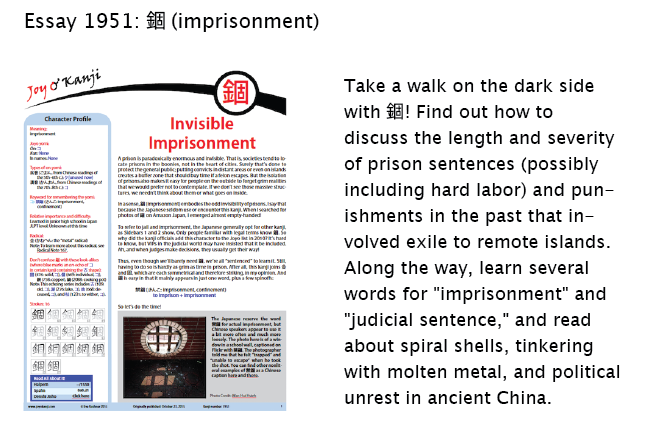Splendor of the Grass Kanji
Here's a quiz of sorts. Take this sentence (from essay 1589 on 挑, "to challenge; provoke; defy; make love to") and see if you can fill in the blank:
彼女は男を挑発する仕草でグラドルになった。
She became a centerfold idol by using ______ to turn men on.
彼女 (かのじょ: she); 男 (おとこ: men); 挑発 (ちょうはつ: exciting, arousing);
仕草 (しぐさ: _____); グラドル (bikini model from "gravure idol," where "gravure" refers to the printing process)
What did she use?! What could 仕草 (しぐさ) mean?
a. grassy hula skirt
b. gestures
c. diligence
d. long, flowing hair
I'll block the answer with a preview of the newest essay:

The answer is b. 仕草 (しぐさ) means "gestures."
If you're familiar with 草 (ソウ, くさ) as "grass" or "weed" (its primary meanings), as in 雑草 (ざっそう: weed), you may be as surprised as I by this usage.
According to one site, people more often write しぐさ as 仕種. Wait, does that make more sense? After all, I associate 種 (シュ, たね) with "seed," so we're still somewhere out in the garden.
Ah, it's true that when 種 stands alone as たね, it means "seed." But this is the same kanji we know well from 種類 (しゅるい: variety, kind, type, category), a word that Halpern's Kanji Learner's Dictionary unthinkably doesn't include! What the hell, Halpern?!
Anyway, 種 can also mean "variety." In 仕種, the latter kanji means "kinds."
But what about 種 as くさ (voiced in 仕種 as -ぐさ)? I thought something odd was going on there as my sources don't include that non-Joyo yomi, but Daijirin and Kanjigen do.
As for the 仕 in 仕種, that kanji means "to serve, do" but is ateji here, according to the aforementioned site, saying that the 仕 provides the し sound that actually corresponds to する.
My proofreader has a different take on it; this 仕 does mean "to do," and the 草/種 means "way of doing," much as it does in this word:
言い草/言い種 (いいぐさ: how one talks) to talk + way of doing
Thus, 仕種 or 仕草 means "way of acting," which is to say "gesture" in the sense of the individual mannerisms that we all have, whether we realize it or not. And to go back to the beginning, one woman used her 仕草 to turn men on, thereby becoming a centerfold idol.
In her case, 草 helped to make her a pro, but it often has the opposite meaning—namely, "amateur." That's the case with this term:
草野球 (くさやきゅう: baseball played in a weed-strewn lot)
weed + baseball (last 2 kanji)
I've provided the literal breakdown of the word, but Halpern says that this 草- (くさ-) actually means "amateur." My proofreader has supplied two more terms of that type:
草競馬 (くさけいぼ: local horse race) amateur + horse racing (last 2 kanji)
草相撲 (くさすもう: amateur sumo wrestling) amateur + sumo (last 2 kanji)
These terms imply that the ground, course, or ring isn’t properly tended and has weeds growing in abundance.
I found more unexpected uses of 草 in these words:
笑い草 (わらいぐさ: laughingstock) laughing + source, material
質草 (しちぐさ: article for pawning) pawn + material
In each case, says Shin Meikai Kokugo Jiten, people originally wrote the latter kanji as 種. That kanji again! And in fact most dictionaries render わらいぐさ as 笑い種, not 笑い草. For しちぐさ, they have both 質草 and 質種.
We can define 草/種 here as "source, material, cause." Again that's a great match for 種. As たね (seed), it gives rise to all kinds of material—so much so that its inverse, ねた, has come to mean "joke material," as well as "sushi ingredient."
By contrast, the closest thing I can find to 草 as "material" is that it can mean "draft, manuscript, outline," as in these terms:
草稿 (そうこう: outline, draft) draft + manuscript, draft
草案 (そうあん: rough draft) draft + draft
I'm beginning to think that 草 is a feeble stand-in, whether for 種, a well-groomed sports arena, or a polished piece of writing! Whereas 種 is the start of a beautiful flower, 草 too often sprouts a weed that people despise and eliminate. I don't remember ever feeling sorry for a kanji before, but at this moment 草 has my full sympathy!
Have a great weekend!

Comments